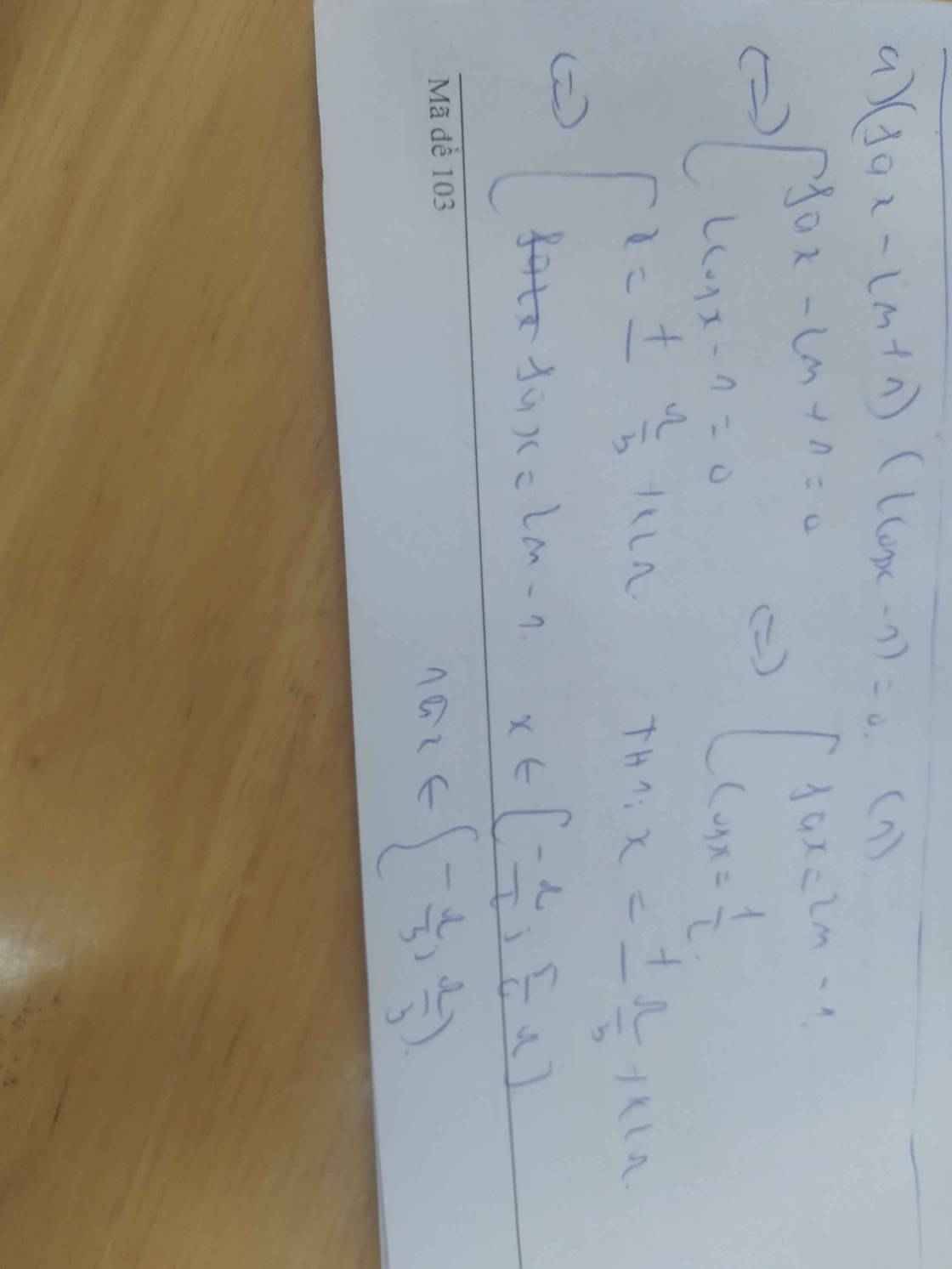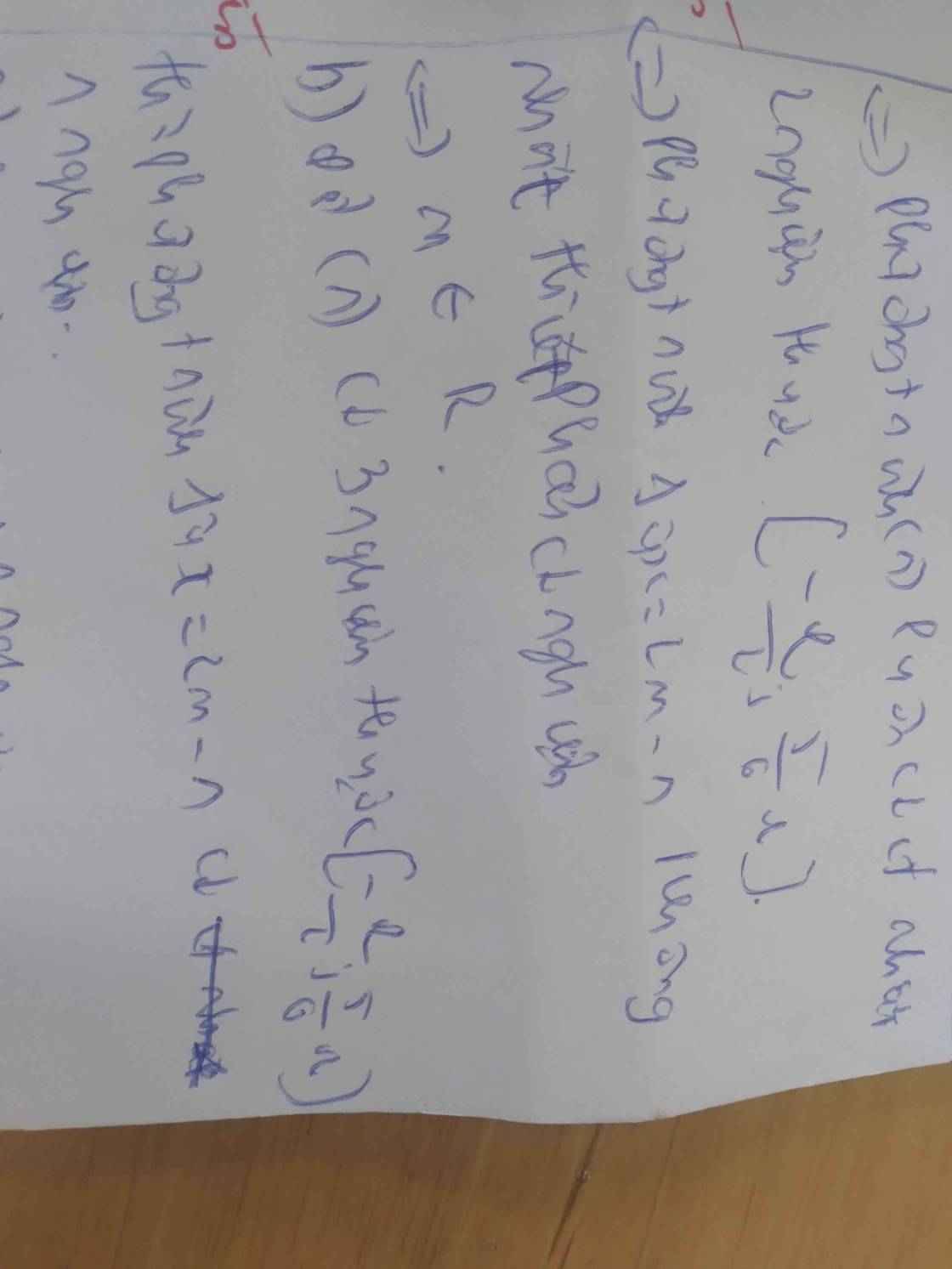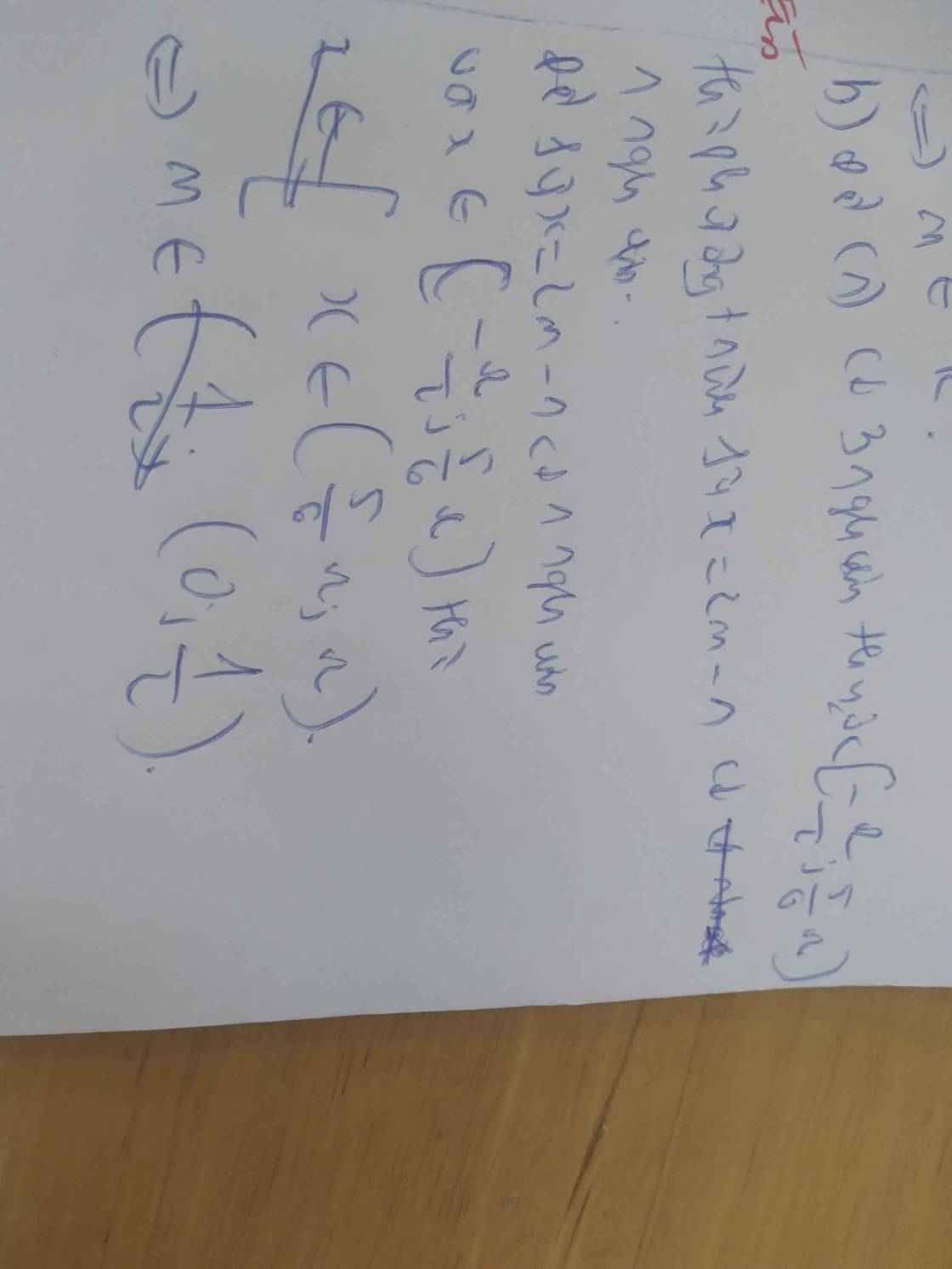Hãy nhập câu hỏi của bạn vào đây, nếu là tài khoản VIP, bạn sẽ được ưu tiên trả lời.

1.
\(cos2x-3cosx+2=0\)
\(\Leftrightarrow2cos^2x-3cosx+1=0\)
\(\Leftrightarrow\left[{}\begin{matrix}cosx=1\\cosx=\dfrac{1}{2}\end{matrix}\right.\)
\(\Leftrightarrow\left[{}\begin{matrix}x=k2\pi\\x=\pm\dfrac{\pi}{3}+k2\pi\end{matrix}\right.\)
\(x=k2\pi\in\left[\dfrac{\pi}{4};\dfrac{7\pi}{4}\right]\Rightarrow\) không có nghiệm x thuộc đoạn
\(x=\pm\dfrac{\pi}{3}+k2\pi\in\left[\dfrac{\pi}{4};\dfrac{7\pi}{4}\right]\Rightarrow x_1=\dfrac{\pi}{3};x_2=\dfrac{5\pi}{3}\)
\(\Rightarrow P=x_1.x_2=\dfrac{5\pi^2}{9}\)
2.
\(pt\Leftrightarrow\left(cos3x-m+2\right)\left(2cos3x-1\right)=0\)
\(\Leftrightarrow\left[{}\begin{matrix}cos3x=\dfrac{1}{2}\left(1\right)\\cos3x=m-2\left(2\right)\end{matrix}\right.\)
\(\left(1\right)\Leftrightarrow x=\pm\dfrac{\pi}{9}+\dfrac{k2\pi}{3}\)
Ta có: \(x=\pm\dfrac{\pi}{9}+\dfrac{k2\pi}{3}\in\left(-\dfrac{\pi}{6};\dfrac{\pi}{3}\right)\Rightarrow x=\pm\dfrac{\pi}{9}\)
Yêu cầu bài toán thỏa mãn khi \(\left(2\right)\) có nghiệm duy nhất thuộc \(\left(-\dfrac{\pi}{6};\dfrac{\pi}{3}\right)\)
\(\Leftrightarrow\left[{}\begin{matrix}m-2=0\\m-2=1\\m-2=-1\end{matrix}\right.\Leftrightarrow\left[{}\begin{matrix}m=2\\m=3\\m=1\end{matrix}\right.\)
TH1: \(m=2\)
\(\left(2\right)\Leftrightarrow cos3x=0\Leftrightarrow x=\dfrac{\pi}{6}+\dfrac{k2\pi}{3}\in\left(-\dfrac{\pi}{6};\dfrac{\pi}{3}\right)\Rightarrow x=\dfrac{\pi}{6}\left(tm\right)\)
\(\Rightarrow m=2\) thỏa mãn yêu cầu bài toán
TH2: \(m=3\)
\(\left(2\right)\Leftrightarrow cos3x=0\Leftrightarrow x=\dfrac{k2\pi}{3}\in\left(-\dfrac{\pi}{6};\dfrac{\pi}{3}\right)\Rightarrow x=0\left(tm\right)\)
\(\Rightarrow m=3\) thỏa mãn yêu cầu bài toán
TH3: \(m=1\)
\(\left(2\right)\Leftrightarrow cos3x=-1\Leftrightarrow x=\dfrac{\pi}{3}+\dfrac{k2\pi}{3}\in\left(-\dfrac{\pi}{6};\dfrac{\pi}{3}\right)\Rightarrow\left[{}\begin{matrix}x=\pm\dfrac{1}{3}\\x=-1\\x=-\dfrac{5}{3}\end{matrix}\right.\)
\(\Rightarrow m=2\) không thỏa mãn yêu cầu bài toán
Vậy \(m=2;m=3\)

Đặt \(\dfrac{\pi}{3}+mx=t\Rightarrow mx=t-\dfrac{\pi}{3}\)
\(\Rightarrow\dfrac{\pi}{6}-mx=\dfrac{\pi}{6}-\left(t-\dfrac{\pi}{3}\right)=\dfrac{\pi}{2}-t\)
Pt trở thành:
\(cos^2t+4cos\left(\dfrac{\pi}{2}-t\right)=4\)
\(\Leftrightarrow1-sin^2t+4sint=4\)
\(\Leftrightarrow sin^2t-4sint+3=0\Rightarrow\left[{}\begin{matrix}sint=1\\sint=3>1\end{matrix}\right.\)
\(\Rightarrow t=\dfrac{\pi}{2}+k2\pi\)
\(\Rightarrow\dfrac{\pi}{3}+mx=\dfrac{\pi}{2}+k2\pi\)
\(\Leftrightarrow mx=\dfrac{\pi}{6}+k2\pi\)
\(\Rightarrow x=\dfrac{1}{m}\left(\dfrac{\pi}{6}+k2\pi\right)\)
\(0< x< 1\Rightarrow0< \dfrac{1}{m}\left(\dfrac{\pi}{6}+k2\pi\right)< 1\Rightarrow-\dfrac{1}{12}< k< \dfrac{m-\dfrac{\pi}{6}}{2\pi}\) (1)
Pt có 4 nghiệm pb trên đoạn đã cho khi có 4 giá trị k nguyên thỏa mãn (1)
\(\Rightarrow k=\left\{0;1;2;3\right\}\)
\(\Rightarrow3< \dfrac{m-\dfrac{\pi}{6}}{2\pi}\le4\)
\(\Rightarrow\dfrac{37\pi}{6}< m\le\dfrac{49\pi}{6}\)
Nghiệm trên \(\left(0;\pi\right)\) hay (0;1) nhỉ?
Thực ra 2 cái này cũng ko khác gì nhau về mặt pp giải toán nhưng mà \(\left(0;\pi\right)\) thì tính toán đẹp hơn \(\left(0;1\right)\) nhiều

sin 3\(\left(x-\dfrac{\pi}{4}\right)=\sqrt{2}sinx\)
<=>\(\left(sinx-cosx\right)^3=4sinx\)
<=>\(sin^3x+3sinxcos^2-3sin^2cosx-cos^3x=4sin\)
th1 cosx=0 thay vào pt thấy vô nghiệm
th2 chia hết 2 vế cho cos3x
<=>\(tan^3x+3tanx-3tan^2x-1=4tanx\left(tan^2+1\right)\)
=x=......
thôi mk giải luôn nhé ! thực ra dùng cách bn kia cũng đc nhưng không hay lắm .
ta có : \(sin^3\left(x+\dfrac{\pi}{4}\right)=\sqrt{2}sinx\) ................(1)
đặc \(t=\dfrac{\pi}{4}+x\Rightarrow x=t-\dfrac{\pi}{4}\)
khi đó phương trình (1) \(\Leftrightarrow sin^3t=\sqrt{2}sin\left(t-\dfrac{\pi}{4}\right)\)
\(\Leftrightarrow sin^3t=sint-cost\Leftrightarrow sint\left(1-sin^2t\right)-cost=0\)
\(\Leftrightarrow sint.cos^2t-cost=0\Leftrightarrow cost\left(\dfrac{sin2t}{2}-1\right)=0\)
\(\Leftrightarrow\left[{}\begin{matrix}cost=0\\sin2t=2\left(vônghiệm\right)\end{matrix}\right.\) \(\Leftrightarrow t=\dfrac{\pi}{2}+k\pi\Leftrightarrow x+\dfrac{\pi}{4}=\dfrac{\pi}{2}+k\pi\)
\(\Leftrightarrow x=\dfrac{\pi}{4}+k\pi\)
vậy phương trình có 1 hệ nghiệm duy nhất : \(x=\dfrac{\pi}{4}+k\pi\) .

d: cos^2x=1
=>sin^2x=0
=>sin x=0
=>x=kpi
a: =>sin 4x=cos(x+pi/6)
=>sin 4x=sin(pi/2-x-pi/6)
=>sin 4x=sin(pi/3-x)
=>4x=pi/3-x+k2pi hoặc 4x=2/3pi+x+k2pi
=>x=pi/15+k2pi/5 hoặc x=2/9pi+k2pi/3
b: =>x+pi/3=pi/6+k2pi hoặc x+pi/3=-pi/6+k2pi
=>x=-pi/2+k2pi hoặc x=-pi/6+k2pi
c: =>4x=5/12pi+k2pi hoặc 4x=-5/12pi+k2pi
=>x=5/48pi+kpi/2 hoặc x=-5/48pi+kpi/2

\(\Leftrightarrow2cos^2\left(x+\dfrac{pi}{3}\right)-1=0\)
=>\(cos\left(2x+\dfrac{2}{3}pi\right)=0\)
=>2x+2/3pi=pi/2+kpi
=>2x=-1/6pi+kpi
=>x=-1/12pi+kpi/2
mà \(x\in\left(-\dfrac{pi}{2};\dfrac{5}{6}pi\right)\)
nên \(x\in\left\{-\dfrac{1}{12}pi;\dfrac{5}{12}pi\right\}\)

1.
\(\Leftrightarrow cos\left(2x+\dfrac{4\pi}{3}\right)=0\)
\(\Leftrightarrow2x+\dfrac{4\pi}{3}=\dfrac{\pi}{2}+k\pi\)
\(\Leftrightarrow2x=-\dfrac{5\pi}{6}+k\pi\)
\(\Leftrightarrow x=-\dfrac{5\pi}{12}+\dfrac{k\pi}{2}\)
b.
\(\Leftrightarrow2+2cos\left(2x+\dfrac{\pi}{3}\right)-3=0\)
\(\Leftrightarrow cos\left(2x+\dfrac{\pi}{3}\right)=\dfrac{1}{2}\)
\(\Leftrightarrow\left[{}\begin{matrix}2x+\dfrac{\pi}{3}=\dfrac{\pi}{3}+k2\pi\\2x+\dfrac{\pi}{3}=-\dfrac{\pi}{3}+k2\pi\end{matrix}\right.\)
\(\Leftrightarrow\left[{}\begin{matrix}x=k\pi\\x=-\dfrac{\pi}{3}+k\pi\end{matrix}\right.\)
c.
\(\Leftrightarrow cos\left(2x-\dfrac{\pi}{6}\right)=\dfrac{\sqrt{3}}{2}\)
\(\Leftrightarrow\left[{}\begin{matrix}2x-\dfrac{\pi}{6}=\dfrac{\pi}{6}+k2\pi\\2x-\dfrac{\pi}{6}=-\dfrac{\pi}{6}+k2\pi\end{matrix}\right.\)
\(\Leftrightarrow\left[{}\begin{matrix}x=\dfrac{\pi}{6}+k\pi\\x=k\pi\end{matrix}\right.\)
cho em hỏi làm sao mà từ đề ra được ạ
b) \(\Leftrightarrow2+2cos\left(2x+\dfrac{\pi}{3}\right)-3=0\)
c)\(\Leftrightarrow cos\left(2x-\dfrac{\pi}{6}\right)=\dfrac{\sqrt{3}}{2}\)



\(\Leftrightarrow cos2x+1+2cos^22x-1=0\)
\(\Leftrightarrow cos2x\left(2cos2x+1\right)=0\)
\(\Leftrightarrow\left[{}\begin{matrix}cos2x=0\\cos2x=-\dfrac{1}{2}\end{matrix}\right.\)
\(\Leftrightarrow\left[{}\begin{matrix}2x=\dfrac{\pi}{2}+k\pi\\2x=\pm\dfrac{2\pi}{3}+k2\pi\end{matrix}\right.\)
\(\Leftrightarrow\left[{}\begin{matrix}x=\dfrac{\pi}{4}+\dfrac{k\pi}{2}\\x=\pm\dfrac{\pi}{3}+k\pi\end{matrix}\right.\)
Không nghiệm nào trong 4 đáp án đúng
Hoặc là đề sai, hoặc là đáp án sai